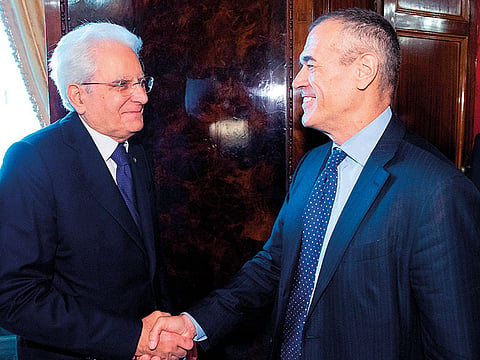Why is Italy facing a new political crisis?
Some want Italian president impeached after he rejected populist parties’ candidate

What has happened?
Italy has been without a government since an election on 4 March resulted in a hung parliament. A fresh political crisis has arisen following the surprise resignation of Giuseppe Conte, a little-known law professor who had been selected by the party that won the largest share of the vote — the Five Star Movement (M5S) — and the far-right Lega to form a populist government.
Conte resigned after the parties’ favoured candidate to serve as finance minister, Paolo Savona, was rejected by the Italian president, Sergio Mattarella.
Could the parties have chosen a different finance minister?
Yes. Savona had been seen as very controversial because of his anti-euro and anti-German views. But the parties, and particularly Matteo Salvini, the Lega leader, insisted on him. One analyst said it was an attempt to try to strong-arm Mattarella and to send a populist message in defiance of the presidential palace as an Italian institution. But Mattarella pushed back against this.
What are the president’s powers?
As president of Italy and head of state, Mattarella has limited powers, but the constitution affords him certain rights. He can formally appoint a head of government and ministers. The president may also dissolve parliament. Italian heads of state have made bold moves in the past. Mattarella’s predecessor Giorgio Napolitano supported the ousting of Silvio Berlusconi as prime minister in 2011.
Did Mattarella overreach?
Critics, including Luigi Di Maio, the M5S leader, were quick to criticise Mattarella, accusing him of an abuse of power and calling for his impeachment. However, previous presidents have also challenged individual ministers. What made the latest development stand out is that the populist leaders insisted on Savona after Mattarella had already objected to his candidacy.
Can the president be impeached?
He could be impeached, but it is seen as extremely unlikely. Italy’s constitutional court would first have to accept that the issue could be taken up by parliament. Then, the combined parliament of about 950 members would have to vote to impeach the president with an absolute majority.
What happens next?
Mattarella has asked Carlo Cottarelli, a technocrat and former International Monetary Fund economist, to form a government after talks on Monday at the presidential palace in Rome.
However, Cottarelli is likely to lose a vote of confidence because he does not have the support of either M5S or Lega. A snap election will need to be held, possibly as early as September. The poll is shaping up to be an unofficial referendum on the issue at the heart of the Savona row: whether or not Italy has a future in the Eurozone.
Sign up for the Daily Briefing
Get the latest news and updates straight to your inbox



